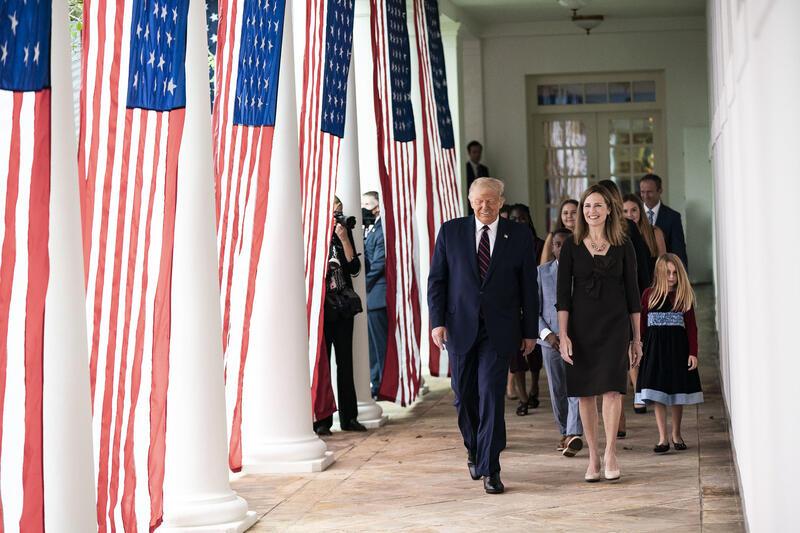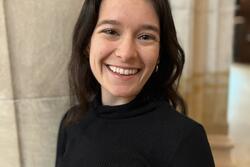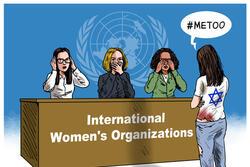I'm an Assault Survivor, and Amy Coney Barrett Scares Me
On the heels of Amy Coney Barrett’s Supreme Court confirmation, I’m reminded of another time, not that long ago, when the Senate questioned a sweating, angry man whose trademark was his carefully labeled calendar of parties and get-togethers, at which he may or may not have assaulted women. When that evidence of Brett Kavanaugh’s lies on the stand didn’t dissuade the Republican-led Senate from appointing him… If I hadn’t already lost my faith in humanity, I would have lost it then.
A week before Kavanaugh’s confirmation, I was assaulted in a parking lot in Tel Aviv. I was drunk and wanted to go for a walk to the beach. My friends told me not to, I snuck out when they weren’t looking, and a bad thing happened. When the man put his arm over my shoulder, it felt like the belt on an amusement park ride locking me into place. When he sat down on something—a short wall? a rock?—and stuck his tongue into my mouth, I launched my mind into the stratosphere. I wasn’t sitting on a stranger’s lap with his dick digging into me; I was so far away, far enough to touch the stars, far enough to be only tangentially associated with my body.
I was lucky. The police showed up, the man ran away, and I was left with nothing but the memory of his body against mine.
The next weekend was a chag, I can’t remember which one, and the head of my program invited me to her house in Beit Shemesh for the weekend. I arrived with a mall-bought chocolate babka wedged under one arm and a backpack loaded with books. I had been assaulted just one week ago, and I could still feel the intrusion lingering on my body. That night, I sat up straight in my bed in the bomb shelter-cum-guest room and plunged into a book, as if I could escape what had happened to me through fiction.
The next day, my head of school and her family had the neighbors over for lunch: a man and a woman with a daughter just a bit younger than I was. The conversation turned to the Kavanaugh confirmation hearings. A few days ago, Christine Blasey Ford had testified before the Senate. “I believe something happened to her, but I don’t think it was him,” the wife said smugly. The husband agreed, remarking that the #MeToo movement had gone too far. “I think the #MeToo movement is really helpful,” I said, my heart pounding and my throat swelling. “It’s given a voice to a lot of survivors.”
They argued, of course. Neither of them thought that women should have the power to disarm men like that, with just their words. I tried to argue them into compassion. “All my friends have been assaulted,” I said. “All of them.” The head of my program frowned. “Then something is wrong with your friends,” she said. There was talk of how drunk girls should know better, how we shouldn’t go to parties and let bad things happen to us.
I had been that drunk girl just a week ago, and as I argued, I kept an eye on the bathroom door in case I needed somewhere to have a quick panic attack. Luckily, the two-hour conversation ended without my autonomic nervous system spinning out of control. Somehow, my right to my own body seemed to have come under question.
Kavanaugh certainly did not seem to think a woman had any right to her own body when he allegedly held Christine Blasey Ford down and forced the memory of his body into her mind, to carry with her forever. The stranger in Tel Aviv did not think that my “no” had meaning when he denied me my own body. To them, the boundaries of our bodies were amorphous. They could not recognize us as people with the right to decide what happens to us.
This world is not kind to women. It’s especially unkind to those of us who are deemed to have made mistakes. That day, I learned that even the head of my program, the woman who was supposed to be creating a home for me, would never understand my pain. I learned that to her, the blame rested with me. Two years later, Amy Coney Barrett sat on the stand and talked circles around her questions. But I’m not surprised: I already knew that women will not always stand up for each other or for other oppressed groups.
Barrett joins two men formally accused of sexual assault on the bench and becomes one of the most powerful people in the United States. She will not use that power for good. Barrett’s record as an appellate judge confirms this. She has a history of ruling against sexual assault survivors and against bodily autonomy. And, of course, she is not alone. She comes from a culture where her views are still the majority and are upheld in many of our laws.
I know from experience that sexual violence has a long half-life. To recover completely, one would need eons. But we don’t have eons. We have one life, circumscribed by mortality. And everyone, including women, has a right to live their life on their own terms. Everyone has the right to live in their own body without infringement. This does not mean that people of other genders do not experience sexual assault; far from it. But the systemic power that men hold over women is not something to be taken lightly.
And yet not all women believe this. Barrett certainly does not. During the hearing, her non-answer when it came to Roe v. Wade spoke volumes. She explained that she does not think the case is a super-precedent, implying that it is subject to change.
“Pro-life” is a weighted term. By definition, it shifts the moral burden of proof to those who believe a pregnant person should be able to decide what happens to their body. It puts people who want sovereignty over their own bodies in the position of arguing that their lives matter as much as a collection of cells.
Forcing a person to go through pregnancy is as much a violation of their selfhood as sexual assault. In both cases, someone is holding up their hand and saying, I do not care what you want. I do not care that all you wanted was a walk on the beach or a night at a party or a life lived on your own terms because what I want matters more. They are saying, You do not belong to yourself. You will never belong to yourself.
When I was assaulted that night in Tel Aviv, I experienced that first-hand. For five minutes or ten minutes, or however long it took before the police arrived, I had little control over what happened to me. My free will felt so far away. No one should be made to feel like that for any reason, whether it be sexual assault or forced pregnancy. We have a duty to ourselves and to other women to fight for what is ours: our bodies, our choices, our lives.








I am a 70 yr old woman who fought for women’s rights and has applauded each step towards independence that has been accomplished over the years and happy that my children and grandchildren have been able to benefit but I have always been aware that there is a thin veneer between what society allows and what they really believe and the fear of being shamed has held things in check. Respect, compassion and free will have lost their meaning. I shudder to think what lies ahead but we must continue to fight and to speak up for our beliefs. So glad you had the courage to write this piece. Blessings and a complete healing for you.
You had a horrible experience and are very brave to come forward and state you opinion. Thank you for that. I hope you have someone that will listen and help you work through this. But the rest of your comments are based on emotion and not fact. There is nothing that says Barrett will do anything but follow the law. Kavanaugh was caught up in false memory. Too many women are assaulted and it is ALWAYS wrong. We must fight for the rights of women and never give up. But when we accuse, we must also be careful.
This took an amazing amount of courage to write. Thank you for leading a new generation of women. I am sorry you, as a generation, have to deal with this backward slide. I wish you well. Stay strong